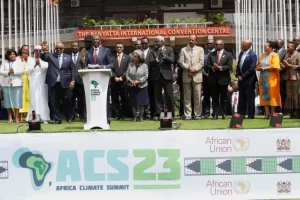

Africa Climate Summit, Road to COP28, Why Africa Leaders must unite to demand climate justice.
A highlight from the activities, and key concerns.
By Israel Prince Orekha of Connected Advocacy www.connectedadvocacy.org.ng.
Nairobi, Kenya hosted the first Africa Climate Summit with a lot of expectations from the impacted communities and concerned groups who are feeling the brunt of the catastrophic impact of the climate crisis. The just-concluded Africa Climate Summit falls short of expectations for these local communities.
According to the 6th Assessment Report (AR6) of the Intergovernmental Panel on Climate Change (IPCC), which states that for the world to be on track to keeping within the 1.5°C limit agreed upon in Paris, global emissions must be cut by 43% in this decade; it also confirmed that Africa is warming faster than the rest of the world and, if unabated, climate change will continue to have adverse impacts on African economies and societies, and hamper growth and well being.
Critical Observation at the Africa Climate Summit/week:
- There was a strong push by some foreign leaders, and companies for the carbon credit/market agenda as the only major solution to mitigate the climate crisis in Africa. There was also no clear direction on how they intended to implement it if it was agreed upon.
- There was no critical road map for action on the local community climate change mitigation plan.
- There is need for a more consented effort from African CSOs to push a joint proposition and agenda for the desired people led and centred changes for our dear continent.
- Country-specific issues and action to mitigate climate change was not outlined.
- Polluters transferring the cause of climate crisis to the burden bearer
Africa Leaders Agreed Commitment for Implementation At The Africa Climate Summit:
Fell short of the people’s expectations, which has clearly put profit over people, investment in the carbon market initiatives without measuring the impact on local communities, opportunity giving to developed nations to keep polluting, while using Africa as a carbon sink to keep emitting, for example, using the Congo forest and wetland as an offset for western carbon footprints.
We also expressed great concern in the declaration by the African leaders in the area of our renewable energy needs, fostering collaboration without a clear road map of engagement with the local communities, this is another open door for resource colonialism by the West.
We think it is time for African leaders to stay coordinated, and to develop their own resources at the continental level to drive local climate solutions that will create green economic growth and job opportunities for their youths.
Our leaders should stop embracing false solutions from the West, without a proper research base to understand the impact of such solutions on the African context before putting them into consideration.
There is a need to prioritize indigenous climate solutions, facilitate local research, demand for technology transfer, and halt capital flight that takes resource and investment production in renewable energy back to the West instead of empowering our local manufacturing sector that will employ our youth to take the lead in the production of the equipment since we have the raw materials to produce the renewable.
Sustainable agricultural practices, without empowering local traditional farmers and providing the enabling environment to enhance food security, are another Greek gift.
The use of the “PHASE DOWN OF COAL” Language rather than phase out and no clear mention of the phase-out of oil and gas is another indication of no plan to put a halt to climate change and its impacts on the African continent
